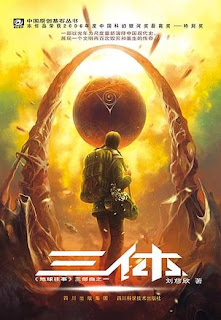The three body problem
“The universe is a dark forest. Every civilization is an armed hunter stalking through the trees like a ghost, gently pushing aside branches that block the path and trying to tread without sound. Even breathing is done with care. The hunter has to be careful, because everywhere in the forest are stealthy hunters like him. If he finds other life—another hunter, an angel or a demon, a delicate infant or a tottering old man, a fairy or a demigod—there’s only one thing he can do: open fire and eliminate them. In this forest, hell is other people. An eternal threat that any life that exposes its own existence will be swiftly wiped out. This is the picture of cosmic civilization. It’s the explanation for the Fermi Paradox.”
― Liu Cixin, The Dark Forest
What do you get when you combine hard sci-fi written by someone as smart as Asimov with the cultural revolution and the chinese culture? Yes, you guessed it correctly it’s this book.
At places this reminded me of Asimov, but a more pessimistic version, someone who has a bleaker outlook on society.
“In China, any idea that dared to take flight would only crash back to the ground. The gravity of reality is too strong.”
― Liu Cixin, The Three-Body Problem
My first question when I finished the book, actually while I was reading it was how was it that the parts about the cultural revolution weren’t censored?
Taken from some answers give by the translator Ken Liu on the subject on an AMA on reddit:
“Censorship in China is an incredibly complicated subject. The relevant regulations are vague and open to interpretation, and what is tolerated or not tolerated can change on a daily basis. (The kinds of things that are most heavily censored may also surprise some Westerners -- e.g., "overly patriotic" statements.) The sort of criticisms that can be voiced depends on the speaker's position as well as the size of the audience. Different rules apply to TV and film as opposed to literature.
Writers and editors generally engage in quite a bit of self-censorship to avoid trouble, but the extent of such self-censorship varies. Someone who's very sensitive to the shifting political winds will be able to figure out exactly where the line is and push right up against it; others will stay far away from sensitive topics.
When it was first published, the Cultural Revolution chapters were moved to the middle of the book because it was around the time of the 30th anniversary of the end of the Cultural Revolution, and such topics were deemed sensitive (but the chapters weren't deleted).
(Also, it’s generally right that criticism of the Cultural Revolution is not some forbidden topic in China. The form of the criticism is tricky, however. Some ways of criticizing the Cultural Revolution are okay, and others are not. And the differences between them can be very subtle unless you're steeped in the political history and contemporary politics of China.)
“I can say that denouncing the Cultural Revolution is not at all controversial in China. That's the official position of the current government, and the overwhelming majority of China's population view the Cultural Revolution as a time of horror and mistake.”
So write sci-fi because the censors of sci-fi are easier to deal with.
This is a tough book to review. The characters do not react as I expected them to. This is either because the emotional side isn’t the author’s strong side, or because of differences between eastern and western cultures. So if you want a romance or a book very focused on characters, this is not it.
The book is hard sc-ifi so the focus is more on the science/physics. I liked this, but again maybe it won’t work for you.
There is a movie coming out in 2017 but there isn’t much information on it. It’s made in China and directed by Panpan Zhang.
“In the shooter hypothesis, a good marksman shoots at a target, creating a hole every ten centimetres. Now suppose the surface of the target is inhabited by intelligent, two-dimensional creatures. Their scientists, after observing the universe, discover a great law: “There exists a hole in the universe every ten centimetres.” They have mistaken the result of the marksman’s momentary whim for an unalterable law of the universe. The farmer hypothesis, on the other hand, has the flavor of a horror story: Every morning on a turkey farm, the farmer comes to feed the turkeys. A scientist turkey, having observed this pattern to hold without change for almost a year, makes the following discovery: “Every morning at eleven, food arrives.” On the morning of Thanksgiving, the scientist announces this law to the other turkeys. But that morning at eleven, food doesn’t arrive; instead, the farmer comes and kills the entire flock.”
― Liu Cixin, The Three-Body Problem
The author does a very good job explaining the science/physics behind everything. This is not a book in which things are left unexplained, there are no "magic technologies.
I also found that the writing style flowed very well. The translator did a very good job at converting the book to English.
Pros:
- Original ideas
- Good writing style
- The science and physics seem researched
- The pars about the cultural revolution
Cons:
- Human interaction seems off?
- No love story - not a con for me but maybe for other people
Grade: 8.5 out of 10.



Comments
Post a Comment